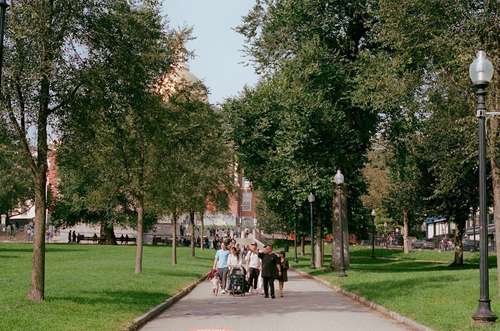The streets in cities across the U.S. have turned into stages of fervent emotion and determined voices, as protests challenge what many see as aggressive and unjust deportation policies. People from all walks of life are coming together, demanding a more humane approach to the country's immigration system. In many ways, this nationwide outcry embodies the very spirit of social justice and civil rights that have long defined America. As we watch these demonstrations unfold, it's hard not to wonder: when will a fair and balanced policy change finally take root?
Every day, news outlets capture the sight of banners waving, chants resonating, and a sea of passion marching through major urban centers. Whether in New York, Chicago or San Francisco, these public demonstrations underscore the determination to protect immigrant rights and challenge U.S. deportation policies that have left many feeling abandoned. With each protest, it is not just a display of dissent but a plea for immigration reform that respects human dignity.
Protests Ignite in Major Cities
The protest movement has expanded across the nation, with cities marking their differences by rallying against aggressive enforcement tactics. Many demonstrators argue that the current deportation laws are not only outdated but also in direct conflict with the U.S. commitment to civil rights and human rights.
Consider the bustling neighborhoods of Chicago where a group of immigrant advocacy organizations organized a massive public demonstration last weekend. Do you remember how electrifying it felt when thousands filled the streets with chants and songs for justice? The scene was one of heart, energy, and a deep call for legal reform. These protests are more than just political statements—they are reflective of the American values held dearly by its citizens, values that emphasize the importance of community, compassion, and fairness.
Many in these cities feel that the U.S. government needs to shift its focus from punitive enforcement to a system that safeguards civil liberties. When you look around, the messages painted on walls and carried on placards evoke a broader conversation about what our immigration reform should look like—one that prioritizes human rights above all.
Voices for Human Rights
This section dives deeper into the rallying cry for a more ethical approach in handling immigration. People are uniting under the banner of human rights, urging policymakers and government leaders to rethink deportation policies that have a harsh impact on communities nationwide.
In cities like San Francisco, local leaders and community organizers have been advocating for an overhaul of the U.S. immigration policy. Their persistent efforts have spotlighted the many personal stories of immigrant families who face separation and the blueprints of anguish driving many protestors forward. Some liken this pivotal moment to a crossroads where policy change is not just possible, but necessary for the future of our nation.
The movement emphasizes benefits beyond just protecting a legal status—they are about restoring hope and building a community that respects and nurtures its vulnerable members. Can anything be more American than caring for others and extending a hand in times of crisis? The analogy of a community garden comes to mind: without each individual's contribution, the garden cannot thrive. The same goes for a society that must stand together to support every member.
With discussions centering around immigrant rights and policy change, everyday citizens are sharing testimonies, showing that the protest movement is as much about personal loss as it is about systemic abuse. A common sentiment among many demonstrators is that these protests reflect the mainstream American desire for fair treatment and legal reform that is inclusive and compassionate.
Call for Policy Reform
As numbers grow, so do calls for comprehensive policy reform that addresses the underlying issues of U.S. deportation policies. Many protesters are not only rallying against current practices but are also advocating for an immigration system that works better for everyone.
The dialogue has shifted from rhetoric to actionable policy suggestions. Several immigrant advocacy groups have put forward proposals that range from creating clearer pathways to citizenship, to bolstering legal assistance for those facing deportation. Imagine an overhaul of a worn-out engine—the parts might be replaced, tuned up, or even redesigned to ensure smoother operation and longer life. This is exactly what reformists are envisioning for a more balanced immigration system.
Discussions have sparked in town halls, community centers, and university campuses. People mention that it is high time for the administration to listen carefully and consider these proposals. The anger felt by protestors isn't just about the current state of affairs but also about the perceived inability of the U.S. immigration policy system to evolve in step with today's realities. When will the policy makers decide to face the challenge of reform, instead of simply clinging to outdated deportation laws?
These demonstrations serve as a reminder of the critical link between public demonstration and legal reform. They prove that when communities organize and speak out, they can shine a light on systemic shortcomings that are in dire need of revision. Whether in large metropolises or in smaller towns, the message is clear: our nation must work towards a more fair and human-centered immigration reform that respects each individual's civil rights.
Impact and Future of the Movement
Looking ahead, the future of the protest movement is intertwined with ongoing debates over U.S. deportation policies. The momentum built by the nationwide protests is challenging the status quo and may well be the catalyst for substantial changes.
Observers point out that history often remembers these pivotal moments when public demonstration pushed policy change. Some participants say these demonstrations are like the bellwether moments in time, resonating far beyond immediate political outcomes and igniting discussions on social justice for generations to come. There is hope that what is being stirred today will eventually transform into a more humane immigration framework, one built on the values of empathy, equity, and respect for human rights.
Events in major cities have already started influencing local government decisions, while activists plan to extend their support to future legislative sessions. The voice of protest has grown louder, making it difficult for officials to ignore the uproar surrounding deportation reform. As this movement continues to swell, it remains evident that the protest is not merely about opposing policies—it is about championing a vision of the U.S. that once again prioritizes compassion over rigid legality.
The ongoing debate is sparking lively discussions on social media platforms and community forums, proving that modern protest movements are just as digital as they are physical. Every public demonstration is a reminder that a healthy democracy is one where people are free to speak out, where civil rights are protected, and where policy challenges are addressed head-on. The call for just and fair immigration reform is a closing plea from the grassroots to the corridors of power.
In essence, these nationwide protests are not only a response to current U.S. deportation policies but a clarion call for immigrant rights, legal reform, and a deeper commitment to human rights. The road to change may be long and winding, but with persistent levels of public engagement, every voice matters in steering the course toward a more inclusive future.
As we reflect on the fervor of these demonstrations, it becomes clear that America remains as much a land of dreams and opportunities as it is a place where justice plays a leading role. The evolution of U.S. immigration policy now hinges on a strategic blend of public pressure, legal advocacy, and a fundamental belief in fairness—a belief that is at the heart of every public demonstration and protest movement that calls for deportation reform.




